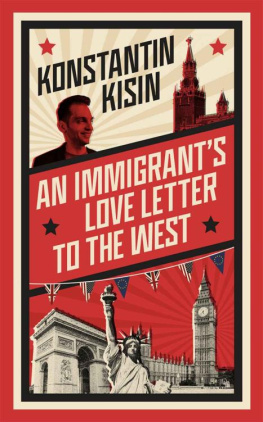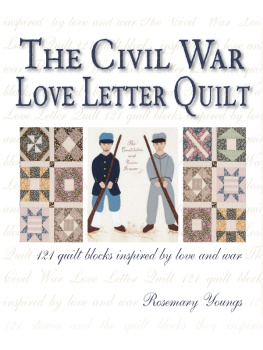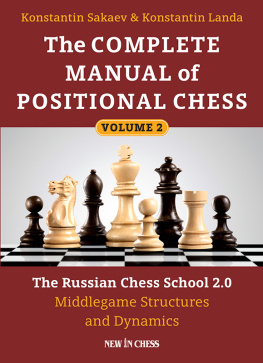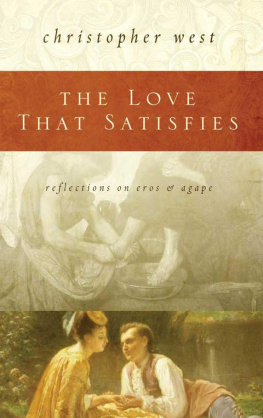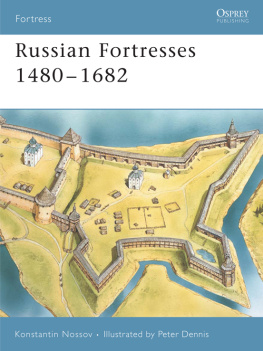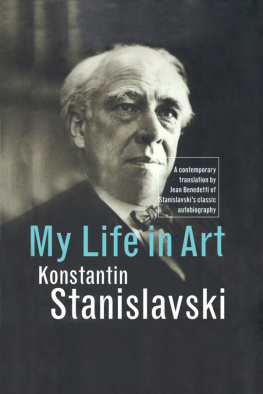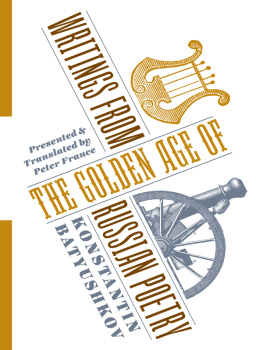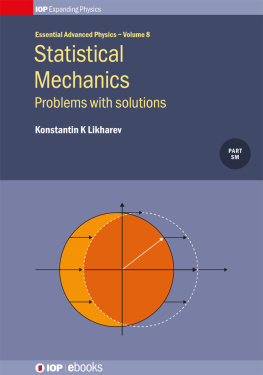Konstantin Kisin - An Immigrants Love Letter to the West
Here you can read online Konstantin Kisin - An Immigrants Love Letter to the West full text of the book (entire story) in english for free. Download pdf and epub, get meaning, cover and reviews about this ebook. year: 2022, publisher: Little, Brown Book Group, genre: Politics. Description of the work, (preface) as well as reviews are available. Best literature library LitArk.com created for fans of good reading and offers a wide selection of genres:
Romance novel
Science fiction
Adventure
Detective
Science
History
Home and family
Prose
Art
Politics
Computer
Non-fiction
Religion
Business
Children
Humor
Choose a favorite category and find really read worthwhile books. Enjoy immersion in the world of imagination, feel the emotions of the characters or learn something new for yourself, make an fascinating discovery.
- Book:An Immigrants Love Letter to the West
- Author:
- Publisher:Little, Brown Book Group
- Genre:
- Year:2022
- Rating:5 / 5
- Favourites:Add to favourites
- Your mark:
- 100
- 1
- 2
- 3
- 4
- 5
An Immigrants Love Letter to the West: summary, description and annotation
We offer to read an annotation, description, summary or preface (depends on what the author of the book "An Immigrants Love Letter to the West" wrote himself). If you haven't found the necessary information about the book — write in the comments, we will try to find it.
An Immigrants Love Letter to the West — read online for free the complete book (whole text) full work
Below is the text of the book, divided by pages. System saving the place of the last page read, allows you to conveniently read the book "An Immigrants Love Letter to the West" online for free, without having to search again every time where you left off. Put a bookmark, and you can go to the page where you finished reading at any time.
Font size:
Interval:
Bookmark:
Published by Constable
ISBN: 978-1-40871-603-8
Copyright Konstantin Kisin, 2022
The moral right of the author has been asserted.
Aleksandr Solzhenitsyn, National Review, 1990, pvii
All rights reserved. No part of this publication may be reproduced, stored in a retrieval system, or transmitted, in any form or by any means, without the prior permission in writing of the publisher.
The publisher is not responsible for websites (or their content) that are not owned by the publisher.
Constable
Little, Brown Book Group
Carmelite House
50 Victoria Embankment
London EC4Y 0DZ
www.littlebrown.co.uk
www.hachette.co.uk
To Alina, without whom nothing would be possible
and everything would be pointless
The strength or weakness of a society depends more on the level of its spiritual life than on its level of industrialisation. Neither a market economy nor even general abundance constitutes the crowning achievement of human life. If a nations spiritual energies have been exhausted, it will not be saved from collapse by the most perfect government structure or by any industrial development. A tree with a rotten core cannot stand.
Aleksandr Solzhenitsyn
W hen I started writing this book in early 2021, I began with a preface that I felt most accurately summed up the challenge facing the Western world. When I showed it to friends, they told me it was beautiful and well-written but insisted that I not include it as it was melodramatic.
I heeded their advice.
However, shortly before the book went to print, in February 2022, Russian forces invaded Ukraine. I hope with all my heart that by the time you are reading these words the conflict has been resolved. No doubt, endless articles have been written about how and why it happened to help people in the West deal with the shock and surprise of the invasion.
There are political, economic, historical, military and even religious explanations for how a war broke out in Europe in the twenty-first century. Many make sense, some are even true. But there is a broader theme few commentators understand or wish to acknowledge which is the subject of this book and the original preface which I include below:
The Gur Emir Mausoleum stands in the heart of the ancient city of Samarkand in modern-day Uzbekistan. The magnificent structure, known colloquially as the Tomb of the Commander, was built to preserve the remains of Tamerlane, a terrifying conqueror who modelled himself on Genghis Khan. His tomb-stone is inscribed with the words When I Rise From the Dead, the Whole World Shall Tremble.
On 21 June, 1941, Soviet anthropologists led by Mikhail Gerasimov opened the tomb on the orders of Joseph Stalin and began exhuming Tamerlanes body. As the scent of frankincense, rose, camphor and resin filled the air, Gerasimov and his team discovered an additional inscription inside the casket: Whoever Disturbs My Tomb Will Unleash an Invader More Terrible Than I. The following morning, Adolf Hitlers Nazi Germany invaded the Soviet Union.
The history of humanity is a series of unopened tombs, which hold not only the stories of our past but also stark warnings about our future.
As I write this in January 2021, the West is suffering from a global pandemic. Covid-19, a virus of the body, has brought devastation to millions of people around the world and forced our governments into unprecedented measures whose consequences will become apparent in the years to come. The virus and our zealous response have ravaged the global economy, deprived us of our civil liberties and caused untold damage in every area of our lives.
But another devastating epidemic has spread like wildfire through the Western world, particularly the Anglosphere, and shows no signs of abating. Unlike Covid, this is a virus of the mind.
If you are fortunate enough to have avoided Twitter, do not work in a progressive industry and are not a recent graduate, your awareness of this virus may be peripheral. You may not yet be familiar with terms like Critical Race Theory, Social Justice and Wokeness. I envy you.
But even so, if youre reading this book youve likely spotted that the world around us is changing at unprecedented speed.
You may have noticed a dramatic change in tone in our public discourse. Nearly two-thirds of Americans now say that they fear expressing their political views, including a majority of Democrats (52 per cent), Independents (59 per cent) and Republicans (77 per cent). In Britain, nearly half of us feel less free to speak our minds, while only 20 per cent feel more free to do so than we did a few years ago.
Perhaps youve watched in confusion as men and women have been positioned not as partners but opponents in some kind of Battle of the Sexes. It may have struck you that our conversations about race have become a way to separate us rather than bring us together.
You may have watched in confusion as statues of historical figures were defaced or torn down by angry mobs. Perhaps your employer brought in someone to explain that being white imbues you with some sort of original sin or that being black or brown makes you a victim of life.
You may even have been on the right side of these issues for years. Perhaps you thought that only bigots worry about expressing their problematic beliefs, that men are toxic and white people should atone for the terrible crimes of their ancestors and their inherited privileges in society. You may have spent your life supporting progressive causes, giving money to charities for disadvantaged groups and being on the right side of history. And yet, as J.K. Rowling discovered, your belief in basic biology may be your undoing nonetheless.
Even if you are fortunate enough to have avoided direct contact with these issues, you may have noticed an odd feeling. What it is you cant explain and, for now, it is relatively easy to ignore. As you busy yourself with daily life, you reassure yourself that things can only get better.
And yet, in those rare moments of reflection, you cannot help feeling a sense of foreboding. It is hard to put into words how you know this but someone somewhere has opened another cursed tomb.
The initial phases of Operation Barbarossa, Hitlers invasion of the Soviet Union, which began on 22 June, 1941, were a huge success. German armoured formations which had blitzkrieged their way through France, Belgium and the Netherlands in 1940 were now speeding towards Moscow, crushing disorganised Soviet resistance as they went.
My great-grandfather, who had just returned home from the Winter War with Finland, was thrown into the meat grinder of the Eastern Front along with millions of others to stop the German advance. Like him, most of them never returned.
If youve ever travelled from Moscows Sheremetyevo airport into the city, you may have noticed three odd-looking metal structures along the road. These anti-tank obstacles mark how close the enemy came to taking the city.
Across the entire front, the Soviet Union fought for its survival. Nowhere was the war more intense than at Stalingrad. Fierce fighting in the city went on for months, with Stalin sacrificing more and more men and materiel in recognition of a simple fact: retreat was no longer an option.
As the Battle of Stalingrad hung in the balance, on 20 December, 1942, the body of Tamerlane was returned to his tomb and given a full Islamic burial. Within days, the Soviet Union mounted a successful counterattack at Stalingrad and went on an offensive that would not stop until it reached Berlin, saving the world from Nazi domination.
Today, the fate of Western civilisation hangs in the balance once again. The tomb of discord and division has been forced open by a small group of ideological zealots. Retreat is no longer an option. Either we bury the hatchet and heal or the whole world shall tremble once more.
Font size:
Interval:
Bookmark:
Similar books «An Immigrants Love Letter to the West»
Look at similar books to An Immigrants Love Letter to the West. We have selected literature similar in name and meaning in the hope of providing readers with more options to find new, interesting, not yet read works.
Discussion, reviews of the book An Immigrants Love Letter to the West and just readers' own opinions. Leave your comments, write what you think about the work, its meaning or the main characters. Specify what exactly you liked and what you didn't like, and why you think so.

